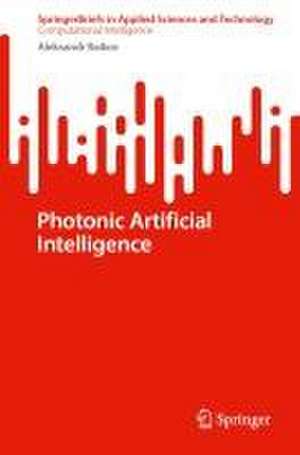Photonic Artificial Intelligence: SpringerBriefs in Applied Sciences and Technology
Autor Aleksandr Raikoven Limba Engleză Paperback – 27 mar 2024
Din seria SpringerBriefs in Applied Sciences and Technology
-
 Preț: 380.29 lei
Preț: 380.29 lei - 17%
 Preț: 360.34 lei
Preț: 360.34 lei - 20%
 Preț: 386.12 lei
Preț: 386.12 lei -
 Preț: 380.07 lei
Preț: 380.07 lei -
 Preț: 377.95 lei
Preț: 377.95 lei -
 Preț: 382.32 lei
Preț: 382.32 lei -
 Preț: 376.59 lei
Preț: 376.59 lei -
 Preț: 379.09 lei
Preț: 379.09 lei -
 Preț: 378.12 lei
Preț: 378.12 lei - 20%
 Preț: 293.83 lei
Preț: 293.83 lei -
 Preț: 344.90 lei
Preț: 344.90 lei -
 Preț: 321.36 lei
Preț: 321.36 lei -
 Preț: 264.79 lei
Preț: 264.79 lei -
 Preț: 344.90 lei
Preț: 344.90 lei -
 Preț: 356.46 lei
Preț: 356.46 lei -
 Preț: 382.95 lei
Preț: 382.95 lei -
 Preț: 355.66 lei
Preț: 355.66 lei -
 Preț: 479.67 lei
Preț: 479.67 lei -
 Preț: 415.18 lei
Preț: 415.18 lei -
 Preț: 444.52 lei
Preț: 444.52 lei - 20%
 Preț: 301.86 lei
Preț: 301.86 lei -
 Preț: 409.43 lei
Preț: 409.43 lei - 20%
 Preț: 322.17 lei
Preț: 322.17 lei -
 Preț: 355.49 lei
Preț: 355.49 lei - 15%
 Preț: 462.51 lei
Preț: 462.51 lei -
 Preț: 377.18 lei
Preț: 377.18 lei -
 Preț: 355.93 lei
Preț: 355.93 lei -
 Preț: 382.95 lei
Preț: 382.95 lei -
 Preț: 378.12 lei
Preț: 378.12 lei -
 Preț: 378.12 lei
Preț: 378.12 lei -
 Preț: 380.07 lei
Preț: 380.07 lei -
 Preț: 380.07 lei
Preț: 380.07 lei - 20%
 Preț: 326.28 lei
Preț: 326.28 lei -
 Preț: 312.68 lei
Preț: 312.68 lei -
 Preț: 356.43 lei
Preț: 356.43 lei -
 Preț: 412.30 lei
Preț: 412.30 lei - 20%
 Preț: 225.31 lei
Preț: 225.31 lei -
 Preț: 378.12 lei
Preț: 378.12 lei -
 Preț: 376.59 lei
Preț: 376.59 lei -
 Preț: 195.87 lei
Preț: 195.87 lei -
 Preț: 376.22 lei
Preț: 376.22 lei - 20%
 Preț: 324.64 lei
Preț: 324.64 lei - 20%
 Preț: 288.73 lei
Preț: 288.73 lei -
 Preț: 377.57 lei
Preț: 377.57 lei -
 Preț: 261.91 lei
Preț: 261.91 lei -
 Preț: 381.98 lei
Preț: 381.98 lei -
 Preț: 273.64 lei
Preț: 273.64 lei -
 Preț: 410.87 lei
Preț: 410.87 lei -
 Preț: 379.68 lei
Preț: 379.68 lei -
 Preț: 374.30 lei
Preț: 374.30 lei
Preț: 272.77 lei
Preț vechi: 340.96 lei
-20% Nou
Puncte Express: 409
Preț estimativ în valută:
52.19€ • 56.87$ • 43.98£
52.19€ • 56.87$ • 43.98£
Carte tipărită la comandă
Livrare economică 21-26 aprilie
Preluare comenzi: 021 569.72.76
Specificații
ISBN-13: 9789819712908
ISBN-10: 9819712904
Pagini: 110
Ilustrații: XVII, 110 p. 14 illus., 12 illus. in color.
Dimensiuni: 155 x 235 mm
Greutate: 0.23 kg
Ediția:2024
Editura: Springer Nature Singapore
Colecția Springer
Seriile SpringerBriefs in Applied Sciences and Technology, SpringerBriefs in Computational Intelligence
Locul publicării:Singapore, Singapore
ISBN-10: 9819712904
Pagini: 110
Ilustrații: XVII, 110 p. 14 illus., 12 illus. in color.
Dimensiuni: 155 x 235 mm
Greutate: 0.23 kg
Ediția:2024
Editura: Springer Nature Singapore
Colecția Springer
Seriile SpringerBriefs in Applied Sciences and Technology, SpringerBriefs in Computational Intelligence
Locul publicării:Singapore, Singapore
Cuprins
Introduction.- Impulse Brain?.- Artificial Mind.- Photonic Psychology.- Emotion Recognition.- Photonic Thought.- Soliton’s Semantics.- Subatomic Semantics.- Dark Mind.- Material Synthesis.- Photonic Learning.
Notă biografică
Professor Aleksandr Raikov is a doctor of technical sciences, chief scientist of the Jinan Institute of Supercomputing Technology in Shandong Province, China, head of the Artificial Intelligence Department of the National Center of Digital Economy, Lomonosov Moscow State University, state advisor of the Russian Federation of 3rd class, and winner of the Russian Government award in the field of Science and Technology. From 1992 to 1999, he was the chief of the Information and Analytical Department of the Russian Presidential Administration. From 1974 to 1991, he developed information systems for high-level state power. He was a student of academician V.A. Kotelnikov, who was one of the discoveries of the sampling theorem. His research and business interests include artificial intelligence, decision support systems, light transformation, and strategic management. He has published 15 books and about 500 papers in peer-reviewed journals and conference proceedings.
Textul de pe ultima copertă
This book addresses an attempt to create Photonic Artificial Intelligence (PAI) system based on optical technologies, which process signals continuously. PAI could help to overcome digital computer limits and almost zero out the machine learning time and AI inference. It helps to consider feelings, the chaos of thoughts, cognitive activity, and the transcendental states of the human mind in AI systems. The book also discusses new problems such as synthesizing new photonic materials, creating optical control systems, and connecting PAI systems with outside digital computers and holographic memory. The book is aimed at a wide range of readers, including postgraduates and researchers, interested in advanced AI by creating its new paradigm, which can help to overcome traps of traditional AI development.
Caracteristici
Discusses Photonic Artificial Intelligence (PAI) system based on optical technologies Discusses new challenges in creating PAI and their solutions Serves as a reference for researchers, students, practitioners, and policymakers
